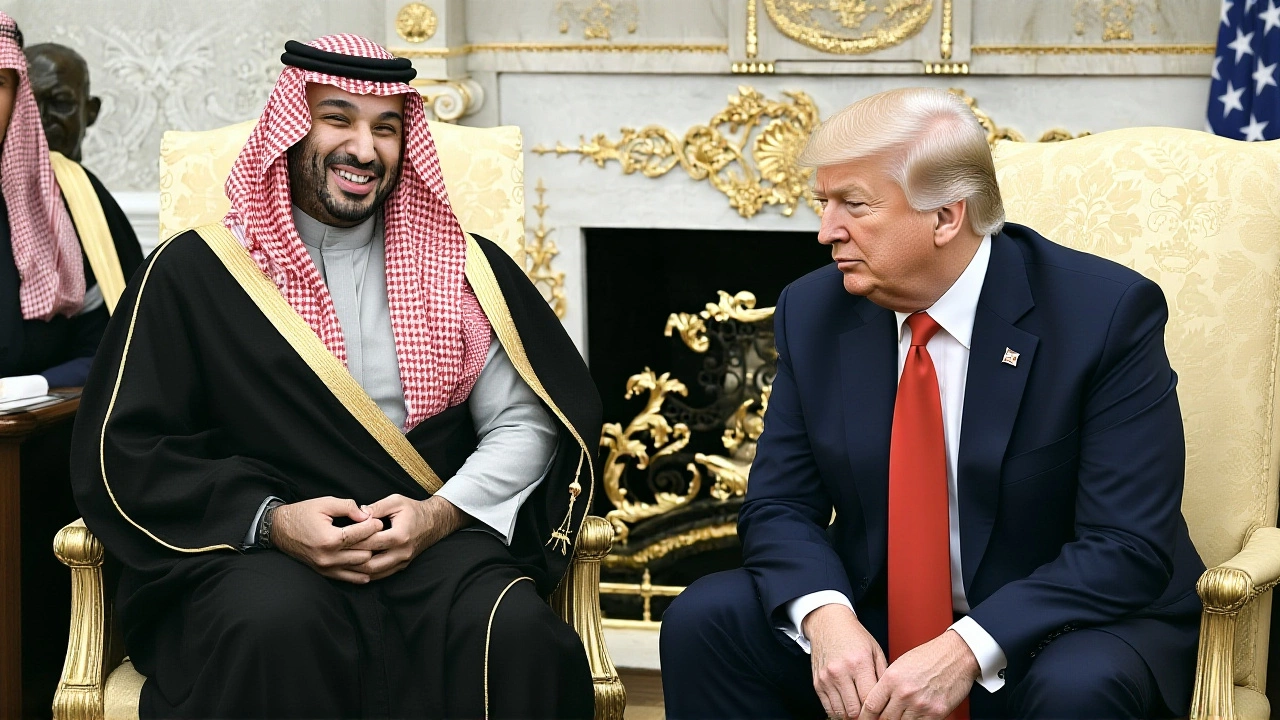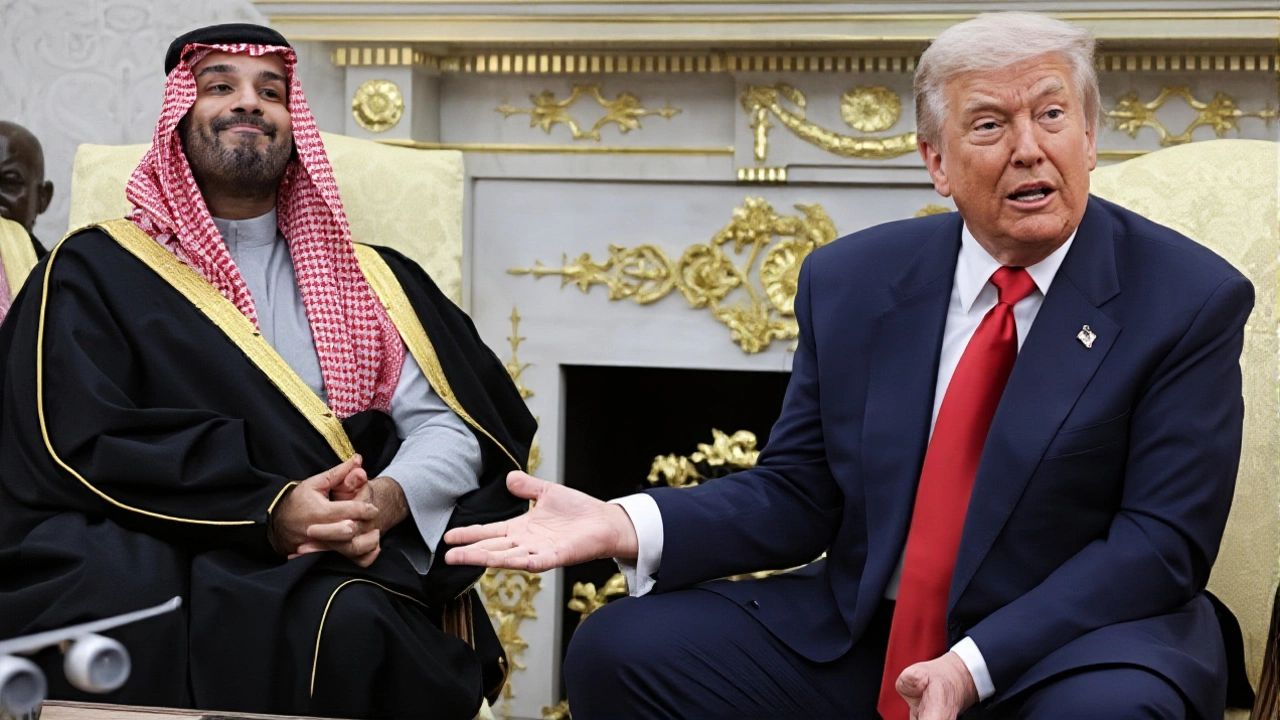When Donald J. Trump greeted Mohammed bin Salman at the White House during his presidency, he didn’t just offer a handshake—he offered a shield. The Crown Prince of Saudi Arabia, the de facto ruler of the Kingdom of Saudi Arabia, had just set foot on U.S. soil for the first time since the brutal 2018 killing of Jamal Khashoggi, a Washington Post columnist and American permanent resident. And while U.S. intelligence agencies had concluded with high confidence that the Crown Prince personally approved the operation, Trump dismissed it outright. "They said he did it?" Trump reportedly said, according to PBS NewsHour correspondent Liz Landers. "We don’t know that." Here's the thing: this wasn’t just diplomacy. It was a deliberate act of political repair. Khashoggi’s murder in the Saudi consulate in Istanbul had sent shockwaves through Washington, Brussels, and beyond. The CIA, NSA, and FBI had all converged on one damning conclusion: Mohammed bin Salman ordered the hit. The U.S. sanctioned 17 Saudi officials under the Global Magnitsky Act. Human Rights Watch and Amnesty International demanded justice. But Trump? He looked past the bloodstains—and straight to the bottom line.
The Welcome That Defied the Evidence
The White House pulled out all the stops. Horse-mounted cavalry escorted the Crown Prince’s motorcade. F-15s roared overhead in tight formation. Rain began to fall just as the black-tie dinner got underway, a poetic touch no screenwriter would dare invent. Inside, Trump and bin Salman discussed two monumental deals: a Saudi pledge to invest "billions of dollars" in the U.S. economy and a new joint security pact. No specifics. No sectors named. No timelines. Just "billions." And yet, the message was clear: money and military cooperation outweighed moral accountability. Liz Landers, reporting live from the White House grounds, noted the stark contrast: "The president's comments directly contradict what the U.S. Intelligence community has concluded, that Mohammad bin Salman did approve the killing of Jamal Khashoggi back in 2018." That line wasn’t just journalism. It was an indictment.Why Khashoggi’s Death Still Matters
Jamal Khashoggi wasn’t just a journalist. He was a critic who’d fled Saudi Arabia after growing disillusioned with its authoritarian turn. His columns in the Washington Post exposed corruption, surveillance, and the erosion of civil liberties under bin Salman’s rule. On October 2, 2018, he walked into the Saudi consulate in Istanbul to obtain paperwork for his upcoming marriage—and never walked out. Turkish authorities later revealed his body was dismembered by a 15-member Saudi hit squad, one of whom had trained in the U.S. The intelligence community didn’t just suspect bin Salman’s involvement—they had intercepted communications, tracked his movements, and analyzed the behavior of his inner circle. The CIA’s assessment, delivered to Congress in November 2018, was unequivocal: "We assess that the Crown Prince approved the operation to capture or kill Jamal Khashoggi." Trump, however, had a different calculus. Saudi Arabia was the largest buyer of U.S. weapons—over $110 billion in arms deals during his term. The kingdom was also a critical oil partner and counterweight to Iran. In Trump’s worldview, alliances were transactional. Principles were negotiable.What This Meant for U.S.-Saudi Relations
Before the visit, U.S.-Saudi ties were frayed. European leaders had called for sanctions. U.S. senators had blocked arms sales. But after Trump’s embrace of bin Salman, the tide turned. Within months, the State Department quietly reversed its stance on arms exports. The Pentagon began joint military exercises with Saudi forces. And the kingdom’s "Vision 2030" economic reforms found new American backers—venture capitalists, construction firms, tech startups—all eager for a slice of the "billions." The joint security agreement, though never formally published, reportedly included expanded intelligence sharing on Iran, cybersecurity cooperation, and training for Saudi special forces. No mention of human rights conditions. No oversight mechanisms. Just mutual defense. It was a quiet coup: the world’s most notorious human rights abuser, once shunned by Western capitals, was now dining with the President of the United States as if nothing had happened.
What’s Next?
The promised Saudi investments? Still unverified. No public registry lists the companies involved. No contracts have been disclosed. Analysts suspect the "billions" are more promise than payment—a PR move to legitimize bin Salman’s global standing. Meanwhile, the U.S. Congress remains divided. Some Democrats have introduced bills to mandate transparency on Saudi investments. Republicans, emboldened by Trump’s precedent, argue that economic ties should not be held hostage to foreign policy disagreements. The Crown Prince, for his part, continues to court Western leaders. He’s met with Macron in Paris, Biden in Washington, and Merkel in Berlin. But none of those meetings carried the same symbolic weight as the one at the White House. That was the moment the U.S. chose profit over principle.The Legacy of a Dismissed Truth
History will judge this moment not by the horsemen or the rain, but by the silence that followed. When the U.S. intelligence community speaks with one voice—and the President chooses to ignore it—what does that say about American values? Khashoggi’s murder wasn’t an isolated crime. It was a test. And the U.S. failed. The Crown Prince still rules Saudi Arabia. The investments may or may not materialize. But the precedent? It’s set. If you’re powerful enough, and rich enough, even murder can be washed away by a handshake and a promise of billions.Frequently Asked Questions
Did the U.S. intelligence community really conclude that Mohammed bin Salman ordered Khashoggi’s murder?
Yes. Multiple U.S. agencies—including the CIA, NSA, and FBI—concluded in November 2018 with "high confidence" that Mohammed bin Salman personally approved the operation to kill Jamal Khashoggi. This assessment was briefed to Congress and supported by intercepted communications and forensic evidence from Istanbul. The CIA later called it the most credible intelligence finding of Trump’s presidency.
Why did Trump dismiss the intelligence findings?
Trump prioritized economic and military ties with Saudi Arabia over human rights concerns. The kingdom had committed to over $110 billion in arms purchases during his term and was a key ally against Iran. Publicly doubting bin Salman risked destabilizing those relationships. Trump also repeatedly questioned the reliability of U.S. intelligence agencies, often calling them "deep state" actors.
What impact did this visit have on U.S. foreign policy?
The visit signaled a major shift: the U.S. was willing to overlook grave human rights abuses if strategic or economic interests aligned. After the meeting, arms sales to Saudi Arabia resumed, joint military drills increased, and Congress lost momentum on sanctions. It emboldened other authoritarian leaders to believe they could act with impunity if they had American business partners.
Have any of the promised Saudi investments in the U.S. been confirmed?
No. While the White House announced "billions of dollars" in planned investments, no public contracts, company names, or sector details have been disclosed. Independent watchdogs like the Center for Strategic and International Studies found no verifiable evidence of new Saudi capital inflows directly tied to the 2018 visit. Critics argue the "billions" were speculative, used as diplomatic leverage rather than committed funding.
How did the international community react to Trump’s defense of bin Salman?
Many allies expressed dismay. The EU, Canada, and the UK reaffirmed their own sanctions against Saudi officials linked to Khashoggi’s murder. The UN Human Rights Council called the U.S. stance "deeply troubling." Even some U.S. allies in the Gulf, like Qatar and Oman, privately questioned the moral cost of the alliance. The visit damaged America’s credibility as a global advocate for press freedom and human rights.
Is there any ongoing legal action related to Khashoggi’s murder?
Turkey continues to pursue criminal charges against 20 Saudi nationals, including senior officials. A Turkish court issued arrest warrants in 2020. The U.S. Department of Justice has not filed charges, despite having evidence. In 2023, a U.S. federal judge dismissed a civil lawsuit brought by Khashoggi’s fiancée against Saudi officials, citing sovereign immunity. Legal accountability remains elusive.

